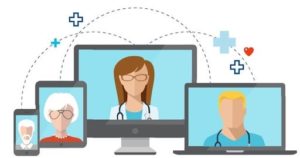Telemedicine for FSHD
 Telemedicine for FSHD is an idea whose time has come! If people with FSHD are rare, doctors who understand FSHD are rarer still. Patients who don’t have the time or resources to travel long distances may never have the opportunity to receive state-of-the art medical care for their condition. That is about to change. One of the silver linings from social distancing during the COVID-19 crisis is the swift and broad embrace of telemedicine by the healthcare sector.
Telemedicine for FSHD is an idea whose time has come! If people with FSHD are rare, doctors who understand FSHD are rarer still. Patients who don’t have the time or resources to travel long distances may never have the opportunity to receive state-of-the art medical care for their condition. That is about to change. One of the silver linings from social distancing during the COVID-19 crisis is the swift and broad embrace of telemedicine by the healthcare sector.
The doctors who lead the FSHD Clinical Trial Research Network (CTRN) have been at the forefront of this change. In our recent webinar, Dr. Jeffrey Statland, co-director of the CTRN, mentioned that he is offering telemedicine consults. In follow up, the FSHD Society worked with Kiley Higgs at the CTRN to compile a list (see below) of the CTRN sites and others that are offering telemedicine, along with contact information for scheduling an appointment. We will be updating this list:
| Institution | Clinic Director | Phone | Fax | |
| University of Washington | Leo Wang, MD | n/a | n/a | n/a |
| UCLA | Perry Shieh, MD | unknown | unknown | unknown |
| University of Utah | Russell Butterfield, MD | (801) 585-7575 | ||
| University of Kansas | Jeffrey Statland, MD | (913) 588-6820 | ||
| The Ohio State University | Samantha LoRusso, MD | (614) 293-4969 | (614) 293-6111 | |
| University of Rochester | Rabi Tawil, MD | (585) 273-2743 | (585) 273-1255 | |
| Kennedy Krieger Inst. | Doris Leung, MD PhD, Julie S. Cohen, genetic counselor, et al. | lasseth@kennedykrieger.org | ||
| Virginia Commonwealth University |
Nick Johnson, MD, Chelsea Chambers, MS LCGC | (804) 482-1260 | Chelsea.Chambers@vcuhealth.org | |
| University of Massachusetts Medical School | Larry Hayward, MD PhD | (508) 334-2527 |

My husband has FSHD and we are looking for a treatment center to evaluate his current condition and
propose a treatment plan. We live in New Mexico but are able to travel to a center that could provide these services. The issues that need addressing of which we are aware are pain management, exercise, individual muscle viability, mobility and assistive technology. Thank you for your help.
If you are able to travel, we recommend visiting an FSHD clinical trial research network site. There is not a site in New Mexico; the closest might be in Denver, Salt Lake City, and Dallas. Please contact us if you would like a referral. info@fshdsociety.org
https://www.fshdsociety.org/therapeutic-accelerator/clinical-trials-copy/